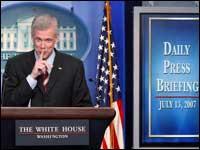Transcript
BROOKE GLADSTONE:
Every Washington watcher knows that the biggest part of politics is public relations. Fraser Seitel has written the book on P.R. - literally. It's a textbook, now in its 10th edition, published by Prentice Hall, called The Practice of Public Relations.
He's a Republican, but in a recent commentary, he gave an emphatic, if nonpartisan, two thumbs down on the Bush administration's P.R. prowess. Fraser, welcome to the show.
FRASER SEITEL:
Well, thank you very much.
BROOKE GLADSTONE:
You say that President George W. Bush will go down in history as, among other things, the worst P.R. administration in history, and you voted for the guy - twice.
FRASER SEITEL:
Yes, that's right. I mean, you get the Iraq war, with its fits and starts and the ill-conceived photo ops declaring victory, and Katrina, with the "good job, Brownie," and then you've got Dick Cheney's aloofness. I did vote for the guy twice, but their public relations has just been miserable.
BROOKE GLADSTONE:
Well, you've just offered us a “Greatest P.R. Gaffe Hits.” But what's the point of saying he is the worst public relations administration in history when what you're really saying - I think, despite the fact that you voted for him twice - is that he has the worst administration in history?
FRASER SEITEL:
Well, you can't pour perfume on a skunk is the axiom in public relations. If the performance is lousy, no amount of spinning or explaining or hyping will make it less lousy.
If the Bush policies aren't effective and if the surge doesn't show results, then I'm afraid there really isn't - and it sounds terrible for a public relations consultant - but I am afraid that there's not much this administration can do. It pretty much is what it is.
And there's another factor at work as well, and that is the President himself. Normally, the best public relations weapon a president has is the bully pulpit, from which you set the nation's agenda. President Bush - and I don't mean this disrespectfully - can't talk. I mean, he is virtually inarticulate.
BROOKE GLADSTONE:
So what would you suggest that the President do now to recover some of that public relations mojo?
FRASER SEITEL:
What public relations can help you do is become more candid and more honest. I think it was a genius stroke to hire Tony Snow because he isn't afraid to defend the policies. General Petraeus is a very good spokesman for the administration policies because he's candid and honest. I'm just afraid that it's too little too late in this particular case.
BROOKE GLADSTONE:
And do you honestly feel that simple disclosure would have made much of a difference in their numbers?
FRASER SEITEL:
Well, what would have made a difference is listening. A good counselor of public relations interpreting not only the President to the public but, equally important - in this case you could argue much more important - interpreting the public back to the President, would have counseled the President to learn that there were mistakes made and that we should acknowledge them; to learn that maybe some mid-course corrections here are in order.
So yes, a stronger public relations presence, technically defined, as I define it, could have helped this administration, absolutely.
BROOKE GLADSTONE:
You astonish me. That is the technical definition of public relations, a two-way street, something indistinguishable from diplomacy?
FRASER SEITEL:
I'm nothing more than an interpreter. I'm like the people at the U.N. And, unfortunately, what happens, not only in a big administration but also in companies and organizations of all types, is that this road back interpreting to the CEO what's going on, what the public really feels, is blocked by an awful lot of sycophants and people feeding him what he wants to hear. And could that have been part of the problem? Yes.
BROOKE GLADSTONE:
Just following this interview, we have a discussion of this recently released document of Richard Nixon's in which he complains about his P.R.
FRASER SEITEL:
Well, he had a lot to complain about. He was surrounded by advertising guys. They weren't P.R. men.
BROOKE GLADSTONE:
Really?
FRASER SEITEL:
Yeah. You know, Haldeman and Erlichman were both advertising guys, and so was Ziegler, the press secretary.
BROOKE GLADSTONE:
And that makes all the difference in the world?
FRASER SEITEL:
Well, technically, if you forgive me, public relations, the cardinal rule is you never lie, or you're not supposed to, and in advertising, of course, it's much more hype. So traditionally if, you know, if you're old like me and you think that this field has underpinnings, you are an advocate for your boss, for your company, but you can't lie, which is different in advertising, which you're always trying to hype something. In this case you're trying to inform, which is different.
BROOKE GLADSTONE:
Fraser, thank you very much.
FRASER SEITEL:
Well, Brooke, thank you very much.
BROOKE GLADSTONE:
Fraser Seitel is the author of The Practice of Public Relations, now in its 10th edition.
[MUSIC UP AND UNDER]
BOB GARFIELD:
Coming up, President Nixon accuses his staff of doing too little P.R., Former Marine Josh Rushing charges the Pentagon with doing too much.
BROOKE GLADSTONE:
This is On the Media from NPR.
[MUSIC UP AND UNDER]

